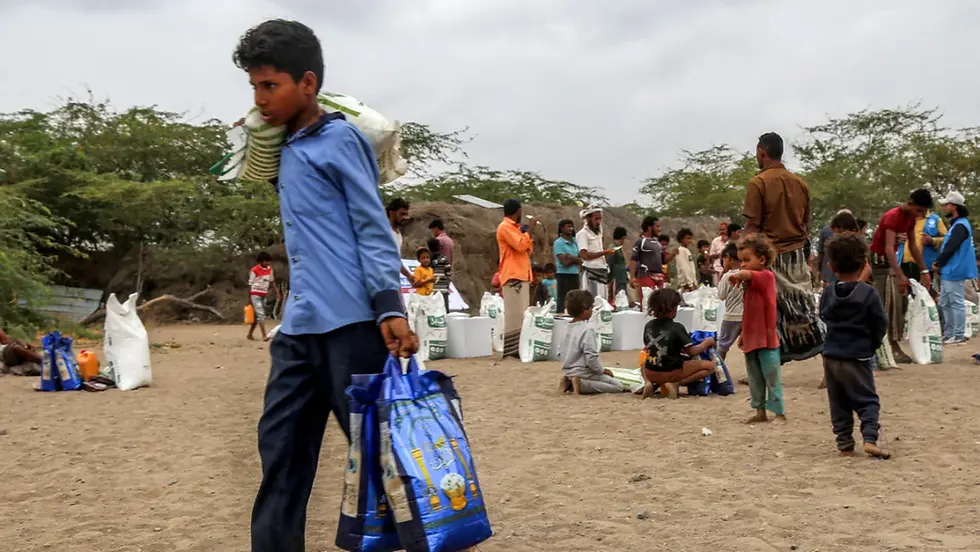Millions of Yemenis at risk due to US aid freeze, Amnesty warns
- Middle East Eye
- 4 days ago
- 3 min read
Trump's aid freeze means Yemen has lost its biggest donor, as the US ramps up military strikes on the country

Amnesty International warned on Thursday that US President Donald Trump’s aid cuts would put millions of Yemenis at risk of life-saving assistance, with malnutrition and hunger set to soar.
“The abrupt and irresponsible cuts in US aid will have catastrophic consequences on Yemen’s most vulnerable and marginalized groups,” Diala Haidar, Amnesty International’s Yemen Researcher, said.
“Unless the US immediately reinstates sufficient funding for lifesaving aid to Yemen and ensures the money is disbursed expeditiously, an already devastating humanitarian situation will further deteriorate, and millions of people in Yemen are going to be left without desperately needed support,” she added.
An assessment of Yemen by the United Nations office for the coordination of humanitarian affairs, released in January, said some 19.5 million people in the country rely on humanitarian assistance and protection services. That's half of the population, and a decade of civil strife and bombing campaigns are worsening the situation.
The Trump administration imposed a 90-day ban on all US foreign aid in January. The State Department said on Wednesday that it had reversed food aid cuts in Somalia, Syria, Lebanon, Jordan, Iraq, and Ecuador, but that the ban would remain in place for now on Afghanistan and Yemen.
That US cut-off marked a serious blow for war-ravaged Yemen, where the US is the largest donor. In 2024 alone, the US provided $768m worth of support, comprising half of Yemen’s coordinated humanitarian response plan, according to Amnesty International.
The freeze has already forced the shutdown of dozens of safe spaces designed to prevent or respond to gender-based violence for Yemeni women and girls, Amnesty warned.
Just two days after taking office in January, Trump re-designated the Houthis as a foreign terrorist organisation. The White House confirmed that the decision would direct USAID to sever ties with entities that have funded or supported the Houthis or obstructed international efforts to address the group's actions.
The Biden administration delisted the Houthis in 2021. When Biden entered office, he suspended US offensive military support for Saudi Arabia's war against the Houthis. The war in Yemen subsided when Saudi Arabia’s Yemeni allies agreed to a UN-brokered truce with the Houthis in April 2022.
After the 7 October 2023 Hamas-led attacks on southern Israel and the subsequent war on Gaza, the Houthis began attacking first Israeli vessels and then American and European ones in the Red Sea, in what they said was in solidarity with besieged Palestinians. Over 50,000 Palestinians have been killed since the war began.
The Houthi attacks all but stopped during the brief Gaza ceasefires. In March, Israel resumed attacking Gaza, and the US started a devastating bombing campaign on Houthi-controlled parts of Yemen. The Houthis control most of the country’s northeast, which includes 80 percent of Yemen’s population.
Amnesty International warned that the US bombing campaign and aid cuts would be a double blow for Yemenis who have endured a decade of conflict.
“Hungry, displaced, and exhausted by violence, people in Yemen already lived in one of the most dire humanitarian crises in the world,” Haidar said.
“The military escalation in Yemen, along with the US aid cuts, will compound the humanitarian disaster already facing a population still reeling from the long-standing conflict,” she added.
Even if US aid is restored, Yemen faces a dire situation.
According to Amnesty, the country’s humanitarian response plan led by the UN has been “consistently and severely underfunded for years. As of April 2025, the plan was only 6.9 percent funded".
Copyright © 2014 - 2025.%C2%A0Middle East Eye. All rights reserved.
